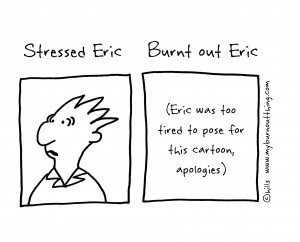I've been asked to write something about the psychological phenomenon of burnout. This refers to exhaustion and reduced interest in work. Although burnout is not a psychological problem detailed in the DSM, it is recognised in the ICD-10 as a "state of vital exhaustion".
Burnout is a serious issue that affects many people at some point in their lives. We are only human and the burdens on our time and our efforts, if consistent and without a break, can have long-term detrimental effects. Sometimes, burnout can feel like a disinterest in work and enjoyment, a need to sleep excessively and a depressed mood. Depression can be a symptom of burnout. Here are a few tips to avoid burnout and what to do if you feel the effects of burnout:
If you feel the effects of burnout:
- Stop delaying time away and holidays. If you’re due a holiday, take it. If you are struggling with normal working hours, speak to your HR manager. It is in their interests to ensure you’re ok in the long-term. If your manager is not helpful, speak to your GP to ask for time off. Remember – you are number 1 and this is not a failing. You must look after yourself for you and the people you love.
- Eat clean – try to bring your diet down to fresh fruit and vegetables and lean proteins for a while with plenty of water. This will help pick up both your mood and energy levels.
- Try to incorporate moderate exercise into your day. This will help boost your energy levels and improve your mood.
- Get 7 – 8 hours’ sleep every night.
- Reduce dependency on caffeine. If I catch anyone with a can of Red Bull, I’m coming over personally to give you a scolding.
- Be brutal about what you must do and what can wait.
- Clean out your environment and your life.
- Avoid doing too much for others as a matter of habit. If the well is empty, nobody drinks.
-
Stress is different to burnout
Prevention of burnout
- In addition to the lifestyle tips above, listen to your body and your mind. When things are getting too much, don’t cover it up with caffeine and pushing through. Do something about your stress and exhaustion early.
- Don’t pretend. If things are not great, speak to a professional or find another outlet such as yoga, travel, exercise or other ways to keep level and balanced.
- Do not consider asking for help as a sign of weakness – when you push yourself to a position where getting up in the morning is a real struggle, you’ll wish you did something earlier.







